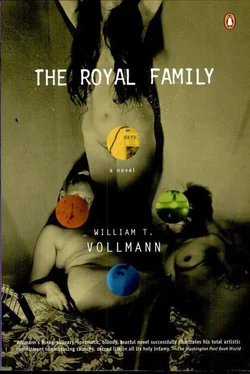William Vollmann - The Royal Family
Здесь есть возможность читать онлайн «William Vollmann - The Royal Family» весь текст электронной книги совершенно бесплатно (целиком полную версию без сокращений). В некоторых случаях можно слушать аудио, скачать через торрент в формате fb2 и присутствует краткое содержание. Год выпуска: 2000, ISBN: 2000, Издательство: Penguin, Жанр: Современная проза, на английском языке. Описание произведения, (предисловие) а так же отзывы посетителей доступны на портале библиотеки ЛибКат.
- Название:The Royal Family
- Автор:
- Издательство:Penguin
- Жанр:
- Год:2000
- ISBN:9780141002002
- Рейтинг книги:5 / 5. Голосов: 1
-
Избранное:Добавить в избранное
- Отзывы:
-
Ваша оценка:
- 100
- 1
- 2
- 3
- 4
- 5
The Royal Family: краткое содержание, описание и аннотация
Предлагаем к чтению аннотацию, описание, краткое содержание или предисловие (зависит от того, что написал сам автор книги «The Royal Family»). Если вы не нашли необходимую информацию о книге — напишите в комментариях, мы постараемся отыскать её.
The Royal Family — читать онлайн бесплатно полную книгу (весь текст) целиком
Ниже представлен текст книги, разбитый по страницам. Система сохранения места последней прочитанной страницы, позволяет с удобством читать онлайн бесплатно книгу «The Royal Family», без необходимости каждый раз заново искать на чём Вы остановились. Поставьте закладку, и сможете в любой момент перейти на страницу, на которой закончили чтение.
Интервал:
Закладка:
That’s not very nice of him, said Tyler. Can’t you bring a book or something for when he’s not looking?
Then I’d never get home. He makes me stop by the Federal Express place at night on my own time.
Tyler had been considering giving Judy a special desk calendar or something of the sort which when properly hung would orient a flat camera at Hal Nemeth’s desk, but now he saw that such grand plans wouldn’t even be necessary. All he’d have to do was take Judy out to dinner a few times, and sooner or later he could get her to bring the mail with her…
And then he was ashamed of himself. What had the poor girl ever done to him?
He handed over the box, stood up, and said abruptly: Well, Judy, this is from Karen, and I thank you for meeting me.
The girl’s mouth dropped open. — You don’t have to go, she said. I mean, if you don’t want to. I can see I made a mistake about you. I think you’re really nice.
Thank you, sweetheart, he said. You’re nice, too. I guess I’ll be getting back.
Don’t you even want to see what Karen gave me?
Maybe it’s something betwen you and her, he said. Well, see you around.
He strode quickly out, got into his car, and drove back to San Francisco, passing the airport with its gloomily lit runways and warehouses, its planes like robot iguanas waiting for the heat of some unholy day to burst through their dark torpor. Nothing but concrete, lights and fog ahead… The nearest parking garage was a sickening prismatic crystal of light. No security-minded Queen would ever set up shop there. It began to drizzle, and the pavement shone as black and strange as squid-ink. He remembered Irene with her baseball cap fashionably backward, thoughtfully bringing chopsticksful of black noodles into her mouth in a Korean-Japanese restaurant in Japantown; the highway was the color of those noodles.
He told H.R. Computer that for legal reasons he couldn’t take the RoboGraphix case. — So you want to kiss away twenty thousand, his client said. — Yeah, drawled Tyler, it’ll be a pretty amorous send-off… — He told his landlord that he was really sorry, but this month the rent would be three or four days late. Whenever he thought about Judy he felt guilty, so every day for the next two weeks he anonymously sent her roses.
Every weekend he drove down to Los Angeles.
| 64 |
After so profitably wrapping up that scam he got a call from John, who said: I was going through Irene’s stuff and found a letter that she wrote you last year.
Flinching from the vibrating anger in John’s voice, Tyler said casually: Is it important? Do you want to send it to me or do you want to read it over the mail?
Why don’t you stop by and pick it up, said John flatly.
All right. I’ll come by after eight.
John hung up.
When Tyler got to John and Irene’s apartment he found the living room crammed with boxes which gaped like graves. Wordlessly John handed him the triple-folded sheet of paper in lavender flare pen which ran:
Dearest Henry,
I hope this letter finds you well. Frankly, I’m a little worried that something must have gone wrong or you wouldn’t be considering disappearing.
I don’t know you well enough to understand if my concern is warranted or intrusive. Please forgive me if the latter is the case. Let me know how you are.
Take good care of yourself.
Love, Irene
John was standing there with his arms folded. — So, what did she mean by your disappearing? he said.
Oh, it was just a kind of black period I went through, said Tyler. I pulled out of it. I guess Irene must have realized it wasn’t such a big deal since she never gave me the letter.
Why didn’t you tell me about it? said John.
Oh, I hated to bother you—
But you never minded bothering my wife. Did she write you any other letters?
Well, said Tyler jauntily, who knows what else you’ll find when you’re packing those boxes?
Oh, just go away, said John. Go home.
You still working with that guy Brady?
So you really don’t feel any responsibility?
Well, I’ll be honest with you. Irene was my friend, my very good friend. I asked her how she was doing and she said she wasn’t especially happy—
Happy with what?
With her life.
What about her life, Hank?
I don’t know. I asked her to call me if she had any problems, and she didn’t, so I figure that you and she were ninety-five percent responsible and I was five percent responsible.
So you were responsible. What exactly did you do to her?
Nobody’s ever innocent, Tyler mumbled, looking at his toes.
It just doesn’t sound like Irene to do what she did, John said.
Well, as a matter of fact it was Irene who… oh, forget it.
Leave me alone, will you?
Sure, John. Thanks for the hospitality. And the great conversation, said Tyler with his hand on the doorknob.
| 65 |
Yes, Tyler had given up. According to John’s cruel characterization, he had long since begun to vegetate, his mind humming and drowsing though the blocky, sun-shadowed pastel landscapes of the Sunset District. (The Richmond District looked much the same.) As for John himself, he had likewise just now laid aside a quarrel with the world, of which such knowledge as he had — less than his brother’s, naturally — inclined him less to master it by analysis than to assert practical control of a small piece of it; and for the rest to find comfort where he could. Irene’s suicide had been both a desolation and a humiliation; but since, as we have stated without sarcasm, he was a member in good standing of the Order of Backbone, he sought not to get ahead of his other grievances. She left him no note, but for almost two months after her installation in the ground, Irene’s credit card bills kept arriving, like the uncanny communications of a Ouija board. Carefully reading them over before he paid, John never found lingerie purchases, or dinners for two that he didn’t know of, or any evidence of other untoward attachments. Nonetheless, his resolution regarding Hank was: friendly but cool, forever. Hank had had something to do with Irene’s death, at least indirectly. Thus John’s instant bench warrant, followed by summary judgment. Were Hank to forthrightly admit his complicity, begging pardon, John could perhaps forgive him, depending on the circumstances (although here John might have been deceiving himself; for when others dare to confess a fault whose existence we may have strongly suspected, but not yet proved to ourselves, we are more likely to gratify our anger than our magnaminity). Meanwhile it was important not to upset their mother unnecessarily. John had already decided that after she lay beyond harm he would, if his brother’s demeanor continued to be evasive, make the break. It wasn’t as if refraining from executing this sentence would assuage his loneliness, Hank never having been good for much; nor (by the same logic) would proceeding so render John any more alone.
Celia, on the other hand, had been sympathetic. During the first month she’d telephoned every day, more often even than his mother; she’d kept herself ready every night to come if he needed her, her overnight bag packed. He knew that each evening when she came home from work the first thing she did, after setting down her slender-strapped scarlet purse on the round table in the hall, and double-locking the door from the inside, was to sit down on her bed and study the answering machine light to see if he had called. (She was under instructions not to bother him at work except on special occasions.) How could he have called? Her telephone extension at work dangled readily from the synapses of his brain. He knew that she went home at five-fifteen, and so never telephoned her between five and six. But still, every day Celia paid him that absurd homage. Well, what if someone else had called? That must be the real reason that she checked her messages. Why wouldn’t she say so? Did she truly imagine him to be so thin-skinned or jealous that he had to believe she waited only for him? The improbable supposition that her motives might be exactly as she’d stated them very occasionally flashed like green numbers across his mental screen, but that made him shudder. He wouldn’t believe that; he couldn’t. How could a grownup professional woman be so desperate? And, if she were, how could he interpret such desperation except as an ominous warning of utter dependency, like a limp drowner dragging the rescuer down with her weight? Better, far better, to believe her capable of telling white lies! All in all, the matter perplexed John, and so he tried not to think about it, especially because it insinuated the parallel image of his brother entering that clammy apartment on Pacheco Street, then loudly and vulgarly pissing, the bathroom door wide open, while the answering machine, turned to maximum volume, blared out whatever propositions it contained. In Hank’s case, of course, the practice reflected merely professional desperation: Would there be a job, so that he could pay the rent? John had loaned his brother money more times than he could remember (which is to say, fewer than he believed; the grandeur of charity easily magnifies itself, if memory is not consulted). At least Celia had never asked John for anything except for his company. She saw him, he supposed, almost as his mother did: a handsome, vivacious boy of excellent prospects, a sweet boy, a practical boy, above all an honest and honorable boy, a success. Whatever John promised to do, he did. The rarity of his promises made them all the more valuable. Celia was clever enough never to extort his word from him, never even to gaze up at him with sadly begging dog-eyes if she could avoid it, for she feared John precisely as much as she loved him, and he was very easily annoyed. Needless to say, she resented feeling afraid, and hid that resentment so that she became his tenderest and most secret enemy. (Would life please bring me a man to love me? she prayed. Please? Please. So far, life only brings me you… ) During John’s marriage she’d taken up evening paralegal classes to prevent herself from disturbing him too often. The fact that she was paying steeply in both time and money for these studies made her take them all the more seriously. She always got her A+, and the teacher praised her.
Читать дальшеИнтервал:
Закладка:
Похожие книги на «The Royal Family»
Представляем Вашему вниманию похожие книги на «The Royal Family» списком для выбора. Мы отобрали схожую по названию и смыслу литературу в надежде предоставить читателям больше вариантов отыскать новые, интересные, ещё непрочитанные произведения.
Обсуждение, отзывы о книге «The Royal Family» и просто собственные мнения читателей. Оставьте ваши комментарии, напишите, что Вы думаете о произведении, его смысле или главных героях. Укажите что конкретно понравилось, а что нет, и почему Вы так считаете.












